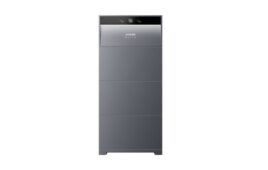Rechargeable zinc battery developer Enzinc has found third-party product testing partners in BASE Technologies, EV charging SaaS company ChargeNet Stations, as well as a global battery manufacturer, a leading electric bike brand and an international waste and recycling provider, which are teaming with Enzinc confidentially.

Photo courtesy Enzinc
The testing will be done at University of California Riverside’s facilities through a CalTestBed award valued at $292,000.
“It’s a vote of confidence in this technology’s potential that a number of companies are teaming with Enzinc during its testing phase,” said Danny Kennedy, chief energy officer of New Energy Nexus. “We’re thrilled that our programs are giving startups like Enzinc a leg up to innovate the way batteries are manufactured and deployed. We need to see more of this if we’re to accelerate the clean energy transition and electrify our economy.”
“Our teaming partners will ensure that our battery’s testing protocols reflect many of the use cases expected for advanced batteries with ‘Enzinc Inside’,” said Michael Burz, Enzinc founder and CEO. “The CalTestBed award will enable us to test how batteries with our exclusive zinc microsponge anode perform in key applications including e-bikes and other electric mobility, stationary power back up, and grid-tied and microgrid energy storage.”
Rebecca Wolkoff, CTO at ChargeNet, looks forward to testing their software with the Enzinc hardware, “We are both committed to creating safe, affordable and sustainable energy storage. We appreciate that our ChargeNet team can provide guidance and feedback on the application of Enzinc’s technology.”
 The competitive CalTestBed initiative is funded through California Energy Commission’s Electric Program Investment Charge (EPIC) program to speed the commercialization of clean energy technologies. It funds third-party testing at world-class facilities at nine University of California campuses and one national laboratory. The program is led by New Energy Nexus in partnership with the University of California Office of the President (UCOP) and the Lawrence Berkeley National Laboratory.
The competitive CalTestBed initiative is funded through California Energy Commission’s Electric Program Investment Charge (EPIC) program to speed the commercialization of clean energy technologies. It funds third-party testing at world-class facilities at nine University of California campuses and one national laboratory. The program is led by New Energy Nexus in partnership with the University of California Office of the President (UCOP) and the Lawrence Berkeley National Laboratory.
Enzinc’s zinc micro sponge anode will power a family of high-performance rechargeable batteries. The anode’s structure allows the battery to provide more than three-times the energy and have three times the lifespan of lead-acid batteries while costing about the same, and it operates through a wider temperature range than lithium-based batteries. The battery is totally recyclable, much safer to use than either lead- or lithium-based batteries and uses zinc, a common material with no supply chain constraints.
News item from Enzinc





Tell Us What You Think!